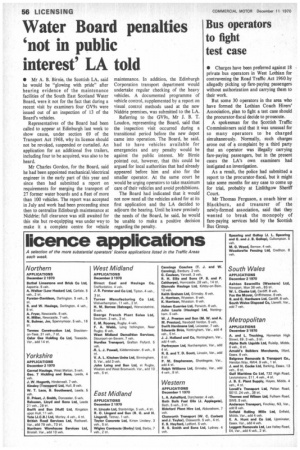Water Board penalties 'not in public interest' LA told
Page 58

If you've noticed an error in this article please click here to report it so we can fix it.
• Mr A. B. Birnie, the Scottish LA, said he would be "glowing with pride" after hearing evidence of the maintenance facilities of the South East Scotland Water Board, were it not for the fact that during a recent visit by examiners four GV9s were issued out of an inspection of 13 of the Board's vehicles.
Representatives of the Board had been called to appear at Edinburgh last week to show cause, under section 69 of the Transport Act 1968. why its licence should not be revoked, suspended or curtailed. An application for an additional five trailers, including four to be acquired, was also to be heard.
Mr Charles Gordon, for the Board, said he had been appointed mechanical/electrical engineer in the early part of this year and since then had submitted a report on requirements for merging the transport of 27 former water boards and a fleet of more than 100 vehicles. The report was accepted in July and work had been proceeding since then to centralize Edinburgh maintenance at Niddrie: full clearance was still awaited for this site but re-equipping was under way to make it a complete centre for vehicle maintenance. In addition. the Edinburgh Corporation transport department would undertake regular checking of the heavy vehicles. A documented programme of vehicle control, supplemented by a report on visual control methods used at the new Niddrie premises, was submitted to the LA.
Referring to the GV9s, Mr J. B. T. Loudon, representing the Board, said that the inspection visit occurred during a transitional period before the new depot came into operation. The Board, he said, had to have vehicles available for emergencies and any penalty would be against the public interest. Mr Birnie pointed out, however, that this could be argued for local authorities that had already appeared before him and also for the smaller operator. At the same court he would be urging operators to take maximum care of their vehicles and avoid prohibitions.
The Board had indicated that it would not now need all the vehicles asked for at its first application and the LA decided to adjourn the hearing. Until he knew precisely the needs of the Board, he said, he would be unable to make a positive decision regarding the penalty.






























































































































































